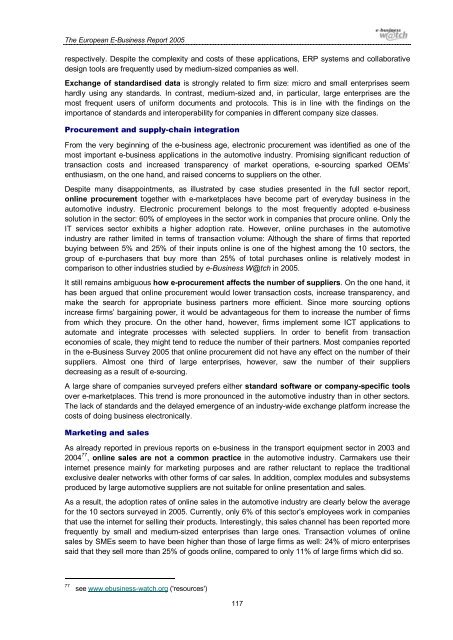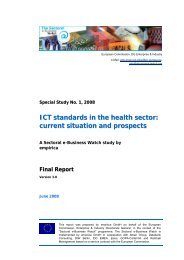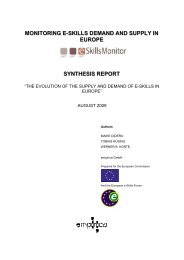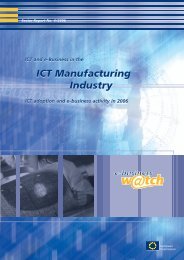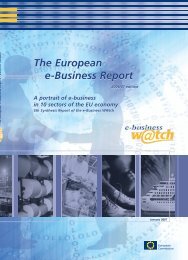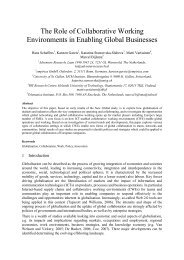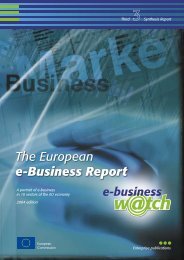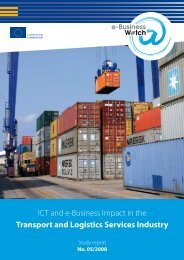The European e-Business Report The European e ... - empirica
The European e-Business Report The European e ... - empirica
The European e-Business Report The European e ... - empirica
You also want an ePaper? Increase the reach of your titles
YUMPU automatically turns print PDFs into web optimized ePapers that Google loves.
<strong>The</strong> <strong>European</strong> E-<strong>Business</strong> <strong>Report</strong> 2005<br />
respectively. Despite the complexity and costs of these applications, ERP systems and collaborative<br />
design tools are frequently used by medium-sized companies as well.<br />
Exchange of standardised data is strongly related to firm size: micro and small enterprises seem<br />
hardly using any standards. In contrast, medium-sized and, in particular, large enterprises are the<br />
most frequent users of uniform documents and protocols. This is in line with the findings on the<br />
importance of standards and interoperability for companies in different company size classes.<br />
Procurement and supply-chain integration<br />
From the very beginning of the e-business age, electronic procurement was identified as one of the<br />
most important e-business applications in the automotive industry. Promising significant reduction of<br />
transaction costs and increased transparency of market operations, e-sourcing sparked OEMs’<br />
enthusiasm, on the one hand, and raised concerns to suppliers on the other.<br />
Despite many disappointments, as illustrated by case studies presented in the full sector report,<br />
online procurement together with e-marketplaces have become part of everyday business in the<br />
automotive industry. Electronic procurement belongs to the most frequently adopted e-business<br />
solution in the sector: 60% of employees in the sector work in companies that procure online. Only the<br />
IT services sector exhibits a higher adoption rate. However, online purchases in the automotive<br />
industry are rather limited in terms of transaction volume: Although the share of firms that reported<br />
buying between 5% and 25% of their inputs online is one of the highest among the 10 sectors, the<br />
group of e-purchasers that buy more than 25% of total purchases online is relatively modest in<br />
comparison to other industries studied by e-<strong>Business</strong> W@tch in 2005.<br />
It still remains ambiguous how e-procurement affects the number of suppliers. On the one hand, it<br />
has been argued that online procurement would lower transaction costs, increase transparency, and<br />
make the search for appropriate business partners more efficient. Since more sourcing options<br />
increase firms’ bargaining power, it would be advantageous for them to increase the number of firms<br />
from which they procure. On the other hand, however, firms implement some ICT applications to<br />
automate and integrate processes with selected suppliers. In order to benefit from transaction<br />
economies of scale, they might tend to reduce the number of their partners. Most companies reported<br />
in the e-<strong>Business</strong> Survey 2005 that online procurement did not have any effect on the number of their<br />
suppliers. Almost one third of large enterprises, however, saw the number of their suppliers<br />
decreasing as a result of e-sourcing.<br />
A large share of companies surveyed prefers either standard software or company-specific tools<br />
over e-marketplaces. This trend is more pronounced in the automotive industry than in other sectors.<br />
<strong>The</strong> lack of standards and the delayed emergence of an industry-wide exchange platform increase the<br />
costs of doing business electronically.<br />
Marketing and sales<br />
As already reported in previous reports on e-business in the transport equipment sector in 2003 and<br />
2004 77 , online sales are not a common practice in the automotive industry. Carmakers use their<br />
internet presence mainly for marketing purposes and are rather reluctant to replace the traditional<br />
exclusive dealer networks with other forms of car sales. In addition, complex modules and subsystems<br />
produced by large automotive suppliers are not suitable for online presentation and sales.<br />
As a result, the adoption rates of online sales in the automotive industry are clearly below the average<br />
for the 10 sectors surveyed in 2005. Currently, only 6% of this sector’s employees work in companies<br />
that use the internet for selling their products. Interestingly, this sales channel has been reported more<br />
frequently by small and medium-sized enterprises than large ones. Transaction volumes of online<br />
sales by SMEs seem to have been higher than those of large firms as well: 24% of micro enterprises<br />
said that they sell more than 25% of goods online, compared to only 11% of large firms which did so.<br />
77<br />
see www.ebusiness-watch.org ('resources')<br />
117


